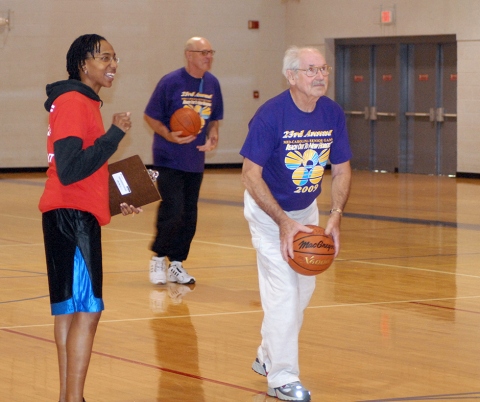Using Neuroscience to Optimize Digital Health Interventions across Adulthood (2019-2020)
This Bass Connections project combined approaches from neuroscience, psychology and global health to identify ways to individually motivate adults to become more physically active and make healthier food choices in daily life. In a community sample of healthy adults (ages 30-80), the project used human brain imaging (fMRI) to assess the sensitivity of motivational brain systems (e.g., striatum and medial prefrontal cortex) to socioemotionally-framed health messages.
After neuroimaging, participants had their activity and eating habits continuously monitored for three months while receiving physical activity and eating-related messages on their mobile phones in the form of programmed voice-over IP and/or text messages (developed in partnership with the Duke Global Digital Health Science Center). The team used the neural measures as predictors of the effectiveness of specific messages delivered via mobile phone to increase activity in daily life.
Ph.D. student Jaime Castrellon (Psychology & Neuroscience) received the 2020 Bass Connections Award for Outstanding Mentorship for his work with this team.
Timing
Summer 2019 – Spring 2020
Team Outputs
Behavioral and Neural Predictors of the Effectiveness of Mobile Digital Health Message Framing (poster by Benitez. C., Castrellon, J.J., Brewington, M., Camejo Coffigny, M., Armora, E., Bendeck, A., Rao, U., Abiodun, S., Green, M.A., Juarez, E.J., Brown, C., Seaman, K.L., Falk, E., Samanez-Larkin, G.R., presented at the annual meeting of the Society for Neuroeconomics, Dublin, Ireland, October 2019)
Self-efficacy, Depressive Symptoms and the Pursuit of Physical Health Rewards (poster by Camejo Coffigny, M., Benitez. C., Armora, E., Castrellon, J.J., Samanez-Larkin, G.R., presented at the annual meeting of the Society for Neuroeconomics, Dublin, Ireland, October 2019)
This Team in the News
Six Ph.D. Graduates Who Leveraged Bass Connections for Their Doctoral Training
Doctoral Students Honored for Commitment to Outstanding Mentorship
See earlier related team, Using Neuroscience to Optimize Digital Health Interventions across Adulthood (2018-2019).
Image: A participant of the Mid-Carolina Senior Games attempts to hit a 3-point shot at the Pope Fitness Center, by Tech. Sgt. Todd Wivell

Team Leaders
- Jaime Castrellon, Arts and Sciences–Psychology and Neuroscience–Ph.D. Student
- Mikella Green, Arts and Sciences–Psychology and Neuroscience–Ph.D. Student
- Gregory Samanez-Larkin, Arts & Sciences-Psychology and Neuroscience
/graduate Team Members
-
Eric Juarez, Psychology-PHD, Psychology-AM
/undergraduate Team Members
-
Alexander Bendeck, Computer Science (BS)
-
Christian Benitez, Neuroscience (BS)
-
Melanie Camejo Coffigny, Neuroscience (AB)
-
Olalla Duato, Neuroscience (BS)
-
Uma Rao, Neuroscience (BS)
/yfaculty/staff Team Members
-
Eliana Armora, Duke Institute for Brain Sciences
-
Gary Bennett, Arts & Sciences-Psychology and Neuroscience
-
Candace Brown, Center for Study of Aging
-
Kendra Seaman, Center for Study of Aging
/zcommunity Team Members
-
Emily Falk, University of Pennsylvania
